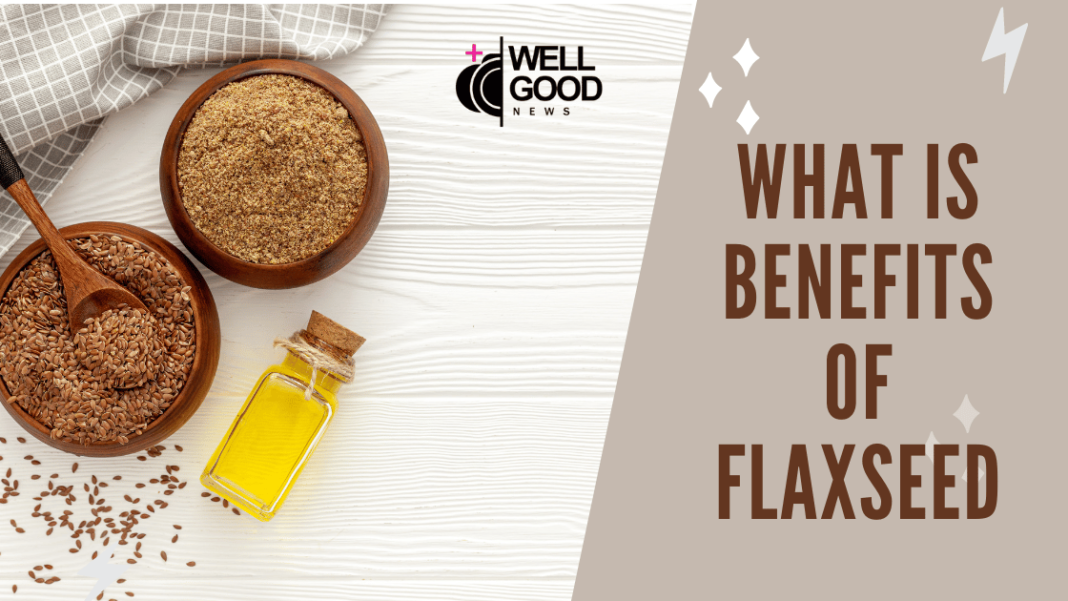Flaxseeds is the seed of the flax plant, and it has been used for thousands of years for its nutritional value. What is benefits of flaxseed? Find out here It can be consumed in various ways, including as an oil or whole (ground) seed. Flaxseed is rich in fiber and omega-3 fatty acids, and many other nutrients that have been shown to have many potential health benefits.
Flaxseeds is an excellent source of fiber—one serving provides about 10 grams—which helps promote healthy digestion and health benefits of flaxseed by keeping you regular. Fiber also helps keep your blood sugar levels stable and may reduce cardiovascular risk and diabetes.
Its oil contains high levels of alpha-linolenic acid (ALA), a type of omega-3s that may help protect against heart disease. The American Heart Association recommends how to eat flaxseed and eating two servings per week of foods containing ALA for people who do not consume seafood regularly.
Table of Contents
What is Flaxseed?

Flaxseed is a plant that produces a small, round, brown seed. The seed contains an oil that can be used in cooking and as a nutritional supplement. Flaxseed is also known as linseed, linum usitatissimum, and linseed oil.
It comes from the flax plant, part of the Linaceae family. The flax plant grows up to 3 feet tall and produces yellow flowers with long stamens. Flax plants are native to Africa but are also grown in Asia and Europe.
Flaxseeds oil is used in many foods and beverages and skin care products. It has several health benefits, including lowering cholesterol levels and reducing inflammation and lower blood pressure. It’s also a useful supplement for women who want to increase breast milk production.
People with a history of heart disease, diabetes, prostate cancer proliferation rates, kidney disease, or high blood pressure levels should not consume flaxseed. If you are taking medications for these conditions, talk to your doctor before consuming flaxseed products.
Benefits of Flaxseeds
It includes several elements with potential health benefits. Similar to other plant-based meals, flaxseeds is an antioxidant powerhouse. Removing free radicals from the body can aid in the prevention of disease caused by a trusted source.
As a result of natural processes and environmental stresses, free radicals are produced. Oxidative stress can arise if there are too many free radicals in the body, leading to cell damage and disease. Antioxidants assist the body in eliminating free radicals. Lignans appear to have antioxidant qualities, and flaxseeds is a rich source.
The health benefits come from the fact that it’s high in fiber and omega-3 fatty acids, as well as phytochemicals called lignans. One tablespoon (7 grams) of ground flaxseeds contains 2 grams of polyunsaturated fatty acids (including the omega 3s), 2 grams of dietary fiber and 37 calories.
Reduce cancer risk
There are omega-3s acids in flaxseeds. According to credible research, they may inhibit the growth of certain types of cancer cells.
Additionally, flaxseeds contains lignans, antioxidants that may decrease tumor growth by limiting the formation of new blood vessels. Regular flaxseeds consumers had a decreased incidence of breast cancer, according to a 2013 study.
Moreover, in 2018, researchers found out that flaxseed may lessen the chance of developing breast cancer after menopause.
Lignans are a form of phytoestrogen, a nutrient derived from plants that function similarly to estrogen. There have been concerns that phytoestrogens may raise the risk of breast cancer, but the current study suggests they may have a preventive effect.
Flaxseed is a great source of alpha-linolenic acid (ALA)
It is an omega-3 fatty acid essential for heart health and health benefits and is largely found in plant-based diets. ALA is one of the two necessary fatty acids that must be obtained from the diet because the body cannot generate them.
Animal research suggests that the ALA in flaxseeds may reduce inflammation and prevent cholesterol deposition in the blood arteries of the heart. Recent research of 8,866 individuals linked increased ALA consumption to lower cholesterol levels and a reduced risk of ischemic heart disease, associated with constricted arteries, and type 2 diabetes.
Enhancing cholesterol and boosting heart health

The American Heart Association (AHA) recommends consuming more fiber and omega-3 fatty acids to improve heart disease.
Also present in flaxseeds are phytosterols. Phytosterols have a structure comparable to cholesterol but hinder cholesterol absorption in the intestines. Therefore, consuming phytosterols may help reduce low-density lipoprotein (LDL) levels, sometimes known as “bad” cholesterol, in the body.
In 2010, researchers examined the impact of flaxseed on the cholesterol levels of moderately high-cholesterol males. Participants received a 20 mg lignan pill, a 100 mg lignan capsule, or a placebo for 12 weeks.
After consuming lignans, cholesterol levels decreased, particularly in those who took 100 mg capsules. The consumption decreased LDL cholesterol levels and aided the body in removing fat, according to a 2012 study including 17 participants. Still, the researchers note that the total diet may also play a role.
Protection against cancer

Flaxseeds are abundant in lignans, plant chemicals with powerful anti-cancer potential. This seed contains 75–800 times as many lignans as other plant foods.
Some studies link flaxseeds consumption to a reduced risk of breast cancer, particularly in postmenopausal women. Studies in animals and test tubes indicate that flax seeds benefits for skin, blood, and lung cancer.
This may help protect against cancer risk by blocking enzymes involved in hormone metabolism and interfering with the growth and spread of tumor cells.
Improve Blood Sugar
For 12 weeks, 41 individuals with obesity and pre-diabetes were given 13 grams, 26 grams, or no flax seed. It was shown that those who consumed 13 grams of flax seeds per day, or approximately two tablespoons, experienced lower blood pressure or blood sugar levels and the highest improvement in insulin sensitivity.
Reducing the symptoms of arthritis
Flaxseeds may help relieve joint pain and stiffness, according to the Arthritis Foundation. Some individuals take this medication to treat rheumatoid arthritis, lupus, and Raynaud’s phenomenon.
There is a shortage of data to support its usage for this purpose, although the ALA in flaxseeds may help reduce inflammation.
Support Weight Management

Due to the soluble fiber content of flaxseeds, including them in your diet may facilitate healthy, long-term weight management. Most of the soluble fiber in flaxseed meal is known as mucilage, which, when combined with water, generates a gel-like consistency.
According to a 2015 Journal of Food Science and Technology article, this slows the rate at which food travels through the stomach, making you feel fuller for longer.
A meta-analysis of 45 trials indicated that flaxseeds consumption was related to significant decreases in body weight and waist circumference. A waist circumference greater than 35 inches for women or 40 inches for males is related to an increased risk of cardiovascular disease and type 2 diabetes.
Inflammation
ALA and lignans, may lessen the inflammation associated with some diseases by inhibiting the release of certain pro-inflammatory chemicals.
ALA has been demonstrated to reduce inflammatory responses in people. Moreover, animal studies have demonstrated that lignans can reduce the levels of numerous pro-inflammatory chemicals. Another method flaxseeds may help prevent heart attacks, and strokes are reducing the inflammation linked with arterial plaque formation.
Hot Flashes
In a 2007 trial of menopausal women, 2 tablespoons of ground flaxseeds mixed into cereal, juice, or yogurt twice daily reduced hot flashes by fifty percent. Additionally, the intensity of their hot flashes decreased by 57%. The flax seeds benefits for female detected an improvement after only one week of daily flaxseeds consumption, and they reached their maximal benefit in just two weeks.
Another study, however, found no significant difference in the reduction of hot flashes between postmenopausal women and breast cancer patients who consumed 410 mg of phytoestrogens from ground flaxseeds and women who consumed a placebo bar.
Enhanced Insulin Sensitivity
Insulin resistance, or the inability to efficiently utilize the hormone insulin to transfer glucose to cells, is the defining characteristic of type 2 diabetes. A meta-analysis of 28 randomized, placebo-controlled trials revealed that whole flaxseed might help with this issue.
Possible Flax Seed Side Effects and Health Risks
Generally speaking, flaxseed and flaxseed oil have few adverse side effects. However, there are a few things you should keep in mind.
First, unprocessed flaxseed may contain poisons. You should limit your use of raw flaxseed. However the toxins are eliminated when the seeds are toasted or baked. Do not use too much flaxseed. Experts recommend consuming no more than 5 tablespoons of flaxseed daily.
All of the fiber in flaxseed is beneficial to improve digestive health, but only if you drink lots of water. Otherwise, it could have the opposite effect and worsen constipation. There is also a possibility that flaxseed will improve digestive health excessively, leading to gastrointestinal troubles such as diarrhea, so do not use too much flaxseed to avoid this.
You should also limit your usage of flaxseed and flaxseed oil if you are:
During pregnancy
Flaxseed and flaxseed oil may interfere with your hormones.
Preparing for an Operation
Flaxseed oil may reduce the ability of your blood to clot, so avoid consuming it for a couple of weeks before your treatment.
Taking Medication
Because flaxseed may help reduce blood pressure levels, consuming it in conjunction with a blood pressure–lowering medicine may cause hypotension.
Have Diabetes
Because flaxseed helps reduce high blood sugar levels, people with diabetes taking medication should be particularly cautious while consuming it.
Tips for using, purchasing, and storing flaxseed:
- When consumed whole flaxseed or flaxseed powder, it is more likely to travel through the intestinal tract undigested, preventing the body from absorbing all of its healthy components. If you wish to grind flaxseed meal, these small electric coffee grinders appear to be the most effective option.
- Flaxseed meal is pulverized flaxseed. Be clear about the various product names for flaxseed meal. Ground or milled flaxseed is the same as a flaxseed meal.
- Purchase either golden or brown flaxseed. Golden flaxseed is more aesthetically pleasing, while brown flaxseed is more readily available in most supermarkets. There is little nutritional difference between the two, so the option is yours.
- It is available in stores and on the internet. Numerous supermarket chains now stock flaxseed meal (or flax meal), flaxseed oil and flaxseed powder. Usually found in the flour or “grain” aisle or the section with whole-grain cereals, it is frequently marketed in 1-pound sacks. It is also available at health food stores and on other websites.
- Examine the product’s label. Check the label of flaxseed-containing items to ensure that ground flaxseed, not whole flaxseed, was used. Cereals, pasta, whole grain breads and crackers, energy bars, meatless meal products, and snack foods include flaxseed.
- Add flaxseed to a food you regularly consume. Every time you consume specific foods, such as oatmeal, smoothies, soup, or yogurt, add a couple of tablespoons of flaxseed meal. Soon, it will become a habit, and you won’t need to think about doing it; you’ll do it.
- Disguise flaxseed in wet, dark foods. The foods that best conceal flaxseed are dark sauces and meat mixes. It is hardly noticed when flaxseed is used in enchilada casserole, chicken parmesan, chili, beef stew, meatloaf, or meatballs.
- The freezer is the best location to store ground flaxseed. Freeze flaxseed in the bag it came in or in a plastic bag that can be sealed if you ground it yourself. The freezer will prevent flaxseed meal from oxidizing and losing their nutritional value.
- The whole flaxseed keeps longer. The outside shell of whole flaxseed appears to protect the fatty acids within. It is advisable to store whole flaxseed in a cold, dark location until it is ground. However, if the flaxseed is dry and of high quality, it can be stored at room temperature for up to a year.
How Do Flaxseed and Chia Seeds Compare Nutritionally?
Not only are flaxseeds trendy, but so are chia seeds, which give flaxseeds a run for their money. Both have gained their reputation as superfoods and are rich in various nutrients, vitamins, and minerals.
The protein content is comparable between the two seeds. Potassium is doubled in flaxseeds. Chia seeds are lower in calories than flaxseed. The calcium content of chia seeds is superior. There are more omega-3 fatty acids in flaxseed. In terms of inducing fullness, chia seeds have an advantage over flaxseed, perhaps due to their higher dietary fiber viscosity.
There is room for a balanced diet for both. You can select your seeds based on what you need to produce more. If you’re looking for omega-3s, choose flaxseed.
FAQs
What effect does flaxseed have on the body?

Flaxseed is an outstanding food choice for its high content of omega-3 fatty acids as well as its high fiber content. On the other hand, it has the ability to lower cholesterol levels, improve insulin sensitivity, and protect against some forms of cancer risk.
Is flaxseed unhealthy? Or is it beneficial?

Without a doubt, flaxseed is healthy for you, and it has many health benefits. It contains numerous vitamins and minerals that contribute to a healthy diet and health benefits. You should limit your use of raw flaxseed, as it may contain contaminants.
Is flaxseed good for weight loss?

Due to its high fiber content, including flaxseed in your diet can aid weight loss. High-fiber foods enhance feelings of fullness and satiety. Thus including flaxseed in your diet may result in you eating less and losing weight.
What exactly is flaxseed oil? How is it manufactured? What are its advantages?
Flaxseed oil is produced by extracting flaxseed oil. Ground flaxseed is then pressed with an oil press to extract the liquid. Flaxseed oil contains a high concentration of ALA, however, some of the other nutrients found in crushed flaxseed may not make it into the processed oil.
How much flaxseed should you eat a day?
Flaxseed has a moderate, nutty flavor that pairs well with various foods. You can incorporate ground flaxseed into the batter for pancakes, waffles, and various baked products, such as muffins and cakes. Some individuals enjoy adding 1 tablespoon of ground or toasted flaxseed to their yogurt or porridge. Additionally, flaxseed oil can be used as a salad dressing or drizzled over roasted vegetables.
Conclusion:
Many possible health benefits of flaxseeds are associated with their abundance of nutrients, including fiber, and beneficial plant components such as lignans.
This tiny seed has the potential to improve digestive health and health benefits, protect against certain types of cancer, normalize blood sugar levels, and reduce blood pressure and cholesterol levels. It is adaptable, tasty, and simple to incorporate into your diet.

